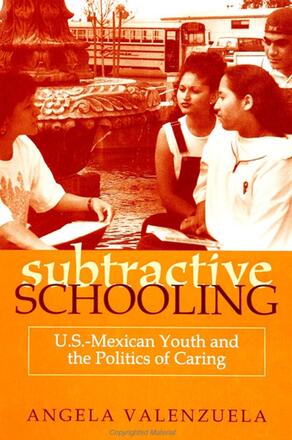
Subtractive Schooling
U.S. - Mexican Youth and the Politics of Caring
Alternative formats available from:
Provides an enhanced sense of what’s required to genuinely care for and educate the U. S.–Mexican youth in America.
Description
Winner of the 2000 Outstanding Book Award presented by the American Educational Research Association
Winner of the 2001 American Educational Studies Association Critics' Choice Award
Honorable Mention, 2000 Gustavus Myers Outstanding Book Awards
Subtractive Schooling provides a framework for understanding the patterns of immigrant achievement and U. S.-born underachievement frequently noted in the literature and observed by the author in her ethnographic account of regular-track youth attending a comprehensive, virtually all-Mexican, inner-city high school in Houston. Valenzuela argues that schools subtract resources from youth in two major ways: firstly by dismissing their definition of education and secondly, through assimilationist policies and practices that minimize their culture and language. A key consequence is the erosion of students' social capital evident in the absence of academically oriented networks among acculturated, U. S.-born youth.
Angela Valenzuela is Professor in Curriculum and Instruction and Center for Mexican American Studies at the University of Texas, Austin.
Reviews
"Valenzuela's thoughtful and thorough analysis of Latino/a students' experiences in a large urban school powerfully defines the educational challenges facing Latino immigrant and U.S.-born youth and outlines important elements for transforming their academic experiences." — Harvard Educational Review
"Professor Valenzuela's book suggests what has to change fundamentally for real reform to occur. This ethnography highlights teacher practices that need to be emulated and rewarded. There are models for becoming an effective teacher with Latino/a and other minority students. Overall Subtractive Schooling is a valuable text that is certain to become a standard in sociology courses in the areas of education, race and ethnicity, and Latino/a studies." — Contemporary Sociology
"What gives credibility to Valenzuela's powerful account is excellent ethnohistorical documentation and a profound knowledge of youth's thought processes. The selection of eloquent and vivid descriptions of the relationships between students and teachers or counselors permits the reader to internalize, from the students' perspective, the meaning of institutional neglect, hostility, and prejudice on the part of school personnel." — Qualitative Studies in Education
"…every government representative, whether at the local, state, or federal level, including the President of the United States, should read this book. Maybe then subtractive schooling would be seen for what it is really worth by people who have the power to 'subtract' it from American society, and to replace it with policies of bilingualism and biculturalism." — Bilingual Education and Bilingualism
"In focusing her attention on caring … Valenzuela provides an important vantage point from which to consider and understand the implications of educational policies and practices designed to move youngsters into the so-called American mainstream." — Anthropology and Education Quarterly
"…a powerful and important addition to the literature on multi-cultural secondary schooling … Subtractive Schooling greatly increases our understanding of the intricate complexity of ethnicity and schooling practices. At the same time, it provides a model for a more authentically caring approach to ethnography as well as a more authentically caring style of teaching." — Bilingual Research Journal
"…groundbreaking…" — Race and Pedagogy Project
"Subtractive Schooling is an astonishing book. It focuses unblinkingly on the harsh underbelly of the American educational tradition—a history that begins with Indian Boarding Schools where youngsters were systematically stripped of their language, their spiritual practices, their families and communities, and continues today in many urban schools where nothing about students' families, communities, or experiences is deemed worthy by officials of constructing a meaningful educational practice. It adds important detail and description of a process that attempts to break children as a prerequisite to teaching them.
"While the concept of 'caring' in schools has become a banal cliché, a tabula rasa upon which anyone—democratic or authoritarian, progressive or reactionary—can scribble anything at all, Angela Valenzuela rescues the concept from complete vacuousness and insists on caring as linked to social justice, caring as political. Valenzuela has done important work that, if taken seriously, can save lives." — William Ayers
"The strong, beautiful writing in this book should be a potent antidote to the enormous tide of shallow propaganda coming from the 'English only' forces. It's a powerfully documented work of scholarship, but wonderfully accessible and richly interwoven with affectionate and vivid narrative. I hope it's given the attention it deserves." — Jonathan Kozol
"This beautifully written book provides powerful documentation of the conditions under which many children of color try to get an education in this country. It should be read by both educators and policy-makers. And then something should be done!" — Nel Noddings, Lee Jacks Professor of Education, Emerita, Stanford University and Professor of Philosophy and Education, Teachers College, Columbia University
"Valenzuela's credible first-hand account of the struggles of Mexican and Chicano high school students brings about a better understanding of underachievement of Latino youth, their feeling of neglect, and their call for help. This volume is a solid sociological study beyond conventional quantitative analysis. It brings the readers into the school and makes them feel in their own flesh the dilemma faced by Latino high school students. An extraordinary contribution; one of a kind. A volume that must be read by teachers and researchers alike." — Henry Trueba, coeditor of Ethnic Identity and Power